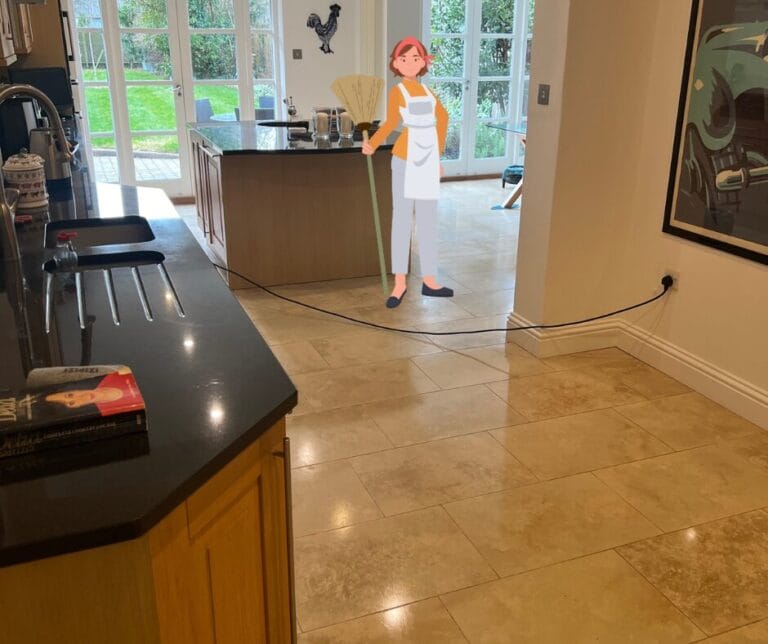As the days grow longer, many of us turn our thoughts to the annual spring cleaning ritual. It’s a time to freshen up our homes and eliminate the dust and clutter accumulated over the winter months. While we often focus on areas like windows, cupboards, and carpets, one aspect of our homes you shouldn’t overlook is the care of stone and tiled floors.
Why Is Stone Floor Care So Important?
Daily life takes its toll on flooring. Stone and tiles, despite their durability, can become dull and damaged over time due to foot traffic, spills, and grit. Properly cleaning and maintaining your stone floors prevents this wear and tear, ensuring they remain a beautiful feature of your home for years to come.
Moreover, some types of stones are porous, meaning they can absorb spills, leading to stains and discolouration. Immediate cleaning of spills and regular deep cleaning is crucial to avoid this, preserving the natural beauty of your stone flooring.
Top Tips for Stone Floor Maintenance
- Regular Cleaning: Begin with daily sweeping or vacuuming to remove loose dirt and grit. When mopping, use a mild detergent or a cleaner specifically designed for stone, diluted in warm water. Avoid using harsh chemicals & abrasive brushes that could scratch the surface.
- Tackling Spills: You should clean spills up immediately to prevent the stone from absorbing the liquid. Blot spills gently with a clean, dry cloth; avoid rubbing, which can push the substance further into the stone.
- Deep Cleaning: Your floors will benefit from a deeper cleaning every so often. Choose a pH-neutral cleaner made for stone floors. If you have tiled floors, pay special attention to grout lines, as these can harbour mould and mildew.
- Sealing: Depending on the type of stone, your floors may benefit from being sealed. Sealing provides a layer of protection against wear and stains. Consult a professional to determine the best type of sealant for your floors and how often you should apply it.
Professional Help
While regular DIY care is vital, sometimes professional cleaning & maintenance can make a significant difference, especially for high-traffic areas or if the stone has become dull or damaged over time. Professionals have the right tools and expertise to deep clean and restore stone floors without causing harm.
So, taking care of your stone floors doesn’t have to be a daunting task. With the right approach and a bit of effort, you can ensure your floors remain a stunning feature of your home throughout the spring and beyond. Remember, the beauty of natural stone is unmatched, and with proper care, it can add warmth and elegance to your home for many years to come.
FAQs on the topic of stone floor cleaning and maintenance
1: How Often Should I Clean My Stone Floors?
We recommend daily sweeping or vacuuming to remove debris that can mark your stone floor. Mopping once a week with a stone floor cleaner is sufficient for most homes. However, the frequency can differ. It depends on the foot traffic and the location of the floor (e.g., kitchens may require more frequent cleaning).
2: Can I Use Vinegar or Lemon Juice to Clean My Stone Floors?
It’s best to avoid using vinegar, lemon juice, or other acidic cleaners on stone floors, as they can etch the surface of some stones like marble, limestone, and travertine. Instead, use a pH-neutral cleaner formulated for natural stone to avoid damaging the floor.
3: How Do I Remove Stains from My Stone Floor?
For most stains, blotting the spill immediately and cleaning with a pH-neutral cleaner is effective. You can apply a poultice from a specific stain-removing powder and a liquid cleaner for tougher stains. The poultice draws the stain out of the stone as it dries. However, the exact method may vary based on the type of stone and the nature of the stain, so consulting a professional may be beneficial for severe stains.
4: Is It Necessary to Seal Stone Floors, and How Often?
Whether you need to seal your stone floor depends on the type of stone and its location. Sealing can provide additional protection against stains, especially for porous stones. Generally, sealing is recommended every one to two years, but this can vary based on the stone’s porosity, the sealant used, and the floor’s exposure to foot traffic and spills. It’s best to consult with a stone care professional to determine the optimal sealing schedule for your specific floor type.






